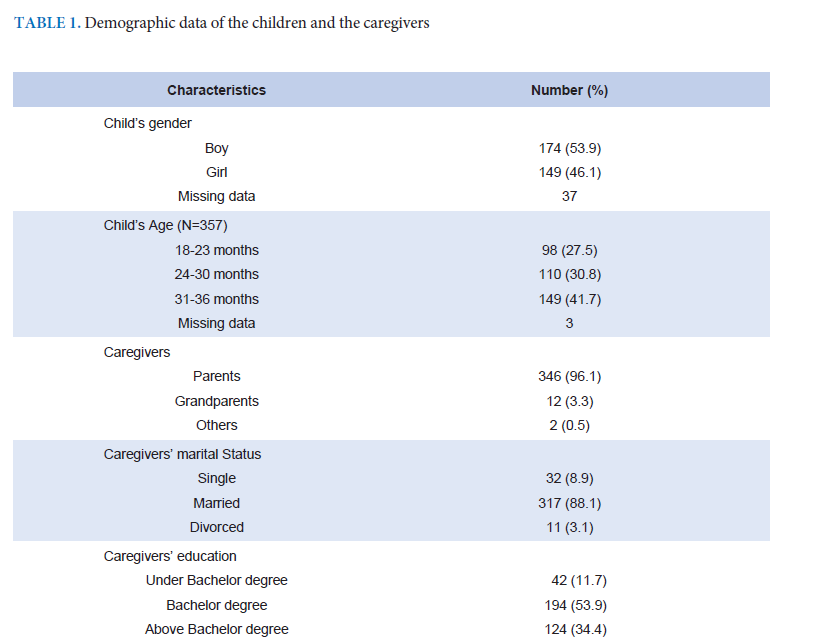The Reliability of the Thai Version of the Toddlers’ Temperament Questionnaire
DOI:
https://doi.org/10.33192/Smj.2022.27Keywords:
temperament, ECBQ questionnaire, Thai toddlersAbstract
Objective: To evaluate the reliability of the Early Childhood Behavior Questionnaire (ECBQ)-very short form, Thai version; and to investigate Thai toddlers’ temperaments
Materials and Methods: The English version of the very short form ECBQ was translated into Thai language. The primary caregivers of 360 healthy, 18-36 months old children, were asked to fill the questionnaire from the period of April, 2018 to June, 2019. The scores were calculated to determine the child’s temperament. The reliability of the very short form ECBQ- Thai version was assessed by Cronbach’s alpha coefficient for internal consistency and Intraclass correlation coefficient (ICC) for inter-rater reliability, two-week and six-month test-retest reliability.
Results: The Cronbach’s alpha coefficients were 0.627-0.692, which indicated questionable internal consistency, but almost reach those of the original ECBQ. The inter-rater ICCs were 0.463-0.670, which were comparable to those in the original English version. The two-week ICCs were 0.602-0.750, which indicated moderate reliability, whereas the six-month ICCs decreased to 0.459-0.602. However, these values almost reached those of the original English version. Most toddlers were reported to have a surgency temperament. Boys significantly had more surgency temperament and had higher mean surgency scores, whereas girls exhibited a more effortful-control temperament.
Conclusion: The very short-form ECBQ, Thai version can be implemented in assessing Thai toddlers’ temperament. The majority of Thai toddlers in this study demonstrated surgency temperament. Boys tended to be more surgency, while girls tended to be more effortful control.
References
Rothbart MK, Derryberry D. Development of individual differences in temperament. In: M.E. Lamb ALB, editors. Advances in developmental psychology. Vol. 1. Hillsdale, NJ: Lawrence Erlbaum Associations; 1981. p. 33-86.
Chess S, Thomas A. Temperamental individuality from childhood to adolescence. J Am Acad Child Psychiatry. 1977;16(2):218-26.
Macari SL, Koller J, Campbell DJ, Chawarska K. Temperamental markers in toddlers with autism spectrum disorder. J Child Psychol Psychiatry. 2017;58(7):819-28.
Kryski KR, Olino TM, Dyson MW, Durbin CE, Klein DN, Hayden EP. Associations between observed temperament in preschoolers and parent psychopathology. Personal Ment Health. 2018;12(2):131-44.
Lee EH, Zhou Q, Eisenberg N, Wang Y. Bidirectional relations between temperament and parenting styles in Chinese children. Int J Behav Dev. 2012;37(1):57-67.
Fullard W, McDevitt SC, Carey WB. Assessing temperament in one- to three-year-old children. J Pediatr Psychol. 1984;9(2):205-17.
Laohaprasitiporn P, Monteerarat Y, Jaderojananont W, Limthongthang R, Vathana T. Validity, reliability and responsiveness of the Thai version of patient-related wrist evaluation. Siriraj Med J. 2021;73(4):275-81.
Janha P, Punyapas S, Ratta-apha W. Parent stress-coping skills and resilience among parents of children with specific learning disorders. Siriraj Med J.. 2021;73(1):38-45.
Pinkaew B, Assansen P, Michel O, Talek K, Phonmanee T, Kerdnoppakhun J. Impact assessment of smell and taste disorders on quality of life in Thais using the SF-36 health survey (Thai version). Siriraj Med J. 2019;71(2):102-9.
Putnam SP, Gartstein MA, Rothbart MK. Measurement of fine-grained aspects of toddler temperament: the early childhood behavior questionnaire. Infant Behav Dev. 2006;29(3):386-401.
Mary Rothbart’s temperament questionnaires. The Early Childhood Behavior Questionnaire (ECBQ) [Internet]. [cited 2020 Nov 30]. Available from: https://research.bowdoin.edu/rothbart-temperament-questionnaires/instrument-descriptions/the-early-childhood-behavior-questionnaire/.
Putnam SP, Jacobs J, Gartstein MA, Rothbart MK. Development and assessment of short and very short forms of the Early Childhood Behavior Questionnaire. Poster presented at: International Conference on Infant Studies; 2010 Mar; Baltimore, MD.
Tavakol M, Dennick R. Making sense of Cronbach’s alpha. Int J Med Educ. 2011;2:53-5.
Glen S. Cronbach’s alpha: simple definition, use and interpretation. [Internet]; 2021 [cited 2020 30 Nov]. Availble from: https://www.statisticshowto.com/cronbachs-alpha-spss/
Koo TK, Li MY. A guideline of selecting and reporting intraclass 224 correlation coefficients for reliability research. J Chiropr Med. 2016;15(2):155-63.
Petra P, Potmesil M. The Early Childhood Behavior Questionnaire Very Short Form (ECBQ VSF) and its adaptation to the population of the Czech Republic. Psychiatr Psychol Klin. 2019;19:281-7.
Slobodskaya HR, Gartstein MA, Nakagawa A, Putnam SP. Early temperament in Japan, the United States, and Russia: do cross-cultural differences decrease with age? J Cross Cult Psychol. 2012;44(3):438-60.
Farkas C, Vallotton C. Differences in infant temperament between Chile and the US. Infant Behav Dev. 2016;44:208-18.
Cozzi P, Putnam SP, Menesini E, Gartstein MA, Aureli T, Calussi P, et al. Studying cross-cultural differences in temperament in toddlerhood: United States of America (U.S.) and Italy. Infant Behav Dev. 2013;36(3):480-3.
Else-Quest NM, Hyde JS, Goldsmith HH, Van Hulle CA. Gender differences in temperament: a meta-analysis. Psychol Bull. 2006;132(1):33-72.

Published
How to Cite
Issue
Section
License

This work is licensed under a Creative Commons Attribution-NonCommercial-NoDerivatives 4.0 International License.
Authors who publish with this journal agree to the following conditions:
Copyright Transfer
In submitting a manuscript, the authors acknowledge that the work will become the copyrighted property of Siriraj Medical Journal upon publication.
License
Articles are licensed under a Creative Commons Attribution-NonCommercial-NoDerivatives 4.0 International License (CC BY-NC-ND 4.0). This license allows for the sharing of the work for non-commercial purposes with proper attribution to the authors and the journal. However, it does not permit modifications or the creation of derivative works.
Sharing and Access
Authors are encouraged to share their article on their personal or institutional websites and through other non-commercial platforms. Doing so can increase readership and citations.














